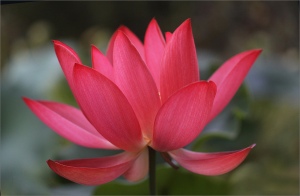
ἵππου] δ᾽ Ἀδρ[ή]στοιο θοώτερον, ὅς ποτ’ ἄνακτα
ῥηϊδί]ως φεύγοντα κατὰ κλόνο̣ν̣ ἐξεσάωσε·
τοῖ]ο̣ν ἐφεζόμενος δαμ̣ασήν[ο]ρα μίμνε λ̣έ̣ο̣ντα
Ἀ]ντίνοος λαιῇ μὲν ἔχων ῥυτῆρα χαλινόν,
δεξιτερῇ δ’ ἔγχος κεκορυθμένο[ν] ἐξ ἀδάμαντος.
πρῶτος δ’ Ἀδριανὸς προϊεὶς χαλκήρεον ἔγχος
οὔτασεν, οὐδὲ δάμασσεν, ἑκὼν γὰρ ἀ̣πή̣μβροτε σ̣[ίντου·
ε]ὐστοχίης γὰρ πάμπαν ἐβούλετο πειρηθῆναι
Ἀ]ργειφοντιάδαο μεγηρ̣ά̣τ̣[ου Ἀντι]νόοιο.
θ]ὴρ δὲ τυπεὶς ἔτι μᾶλλο̣ν̣ [ὀ]ρ̣ίνετο, ποσσὶ δ’ ἄμυσσ[ε
γαῖαν τρηχαλ[έ]η[ν] θυμούμ[ε]νος, ἐκ δὲ κονίη
ὡ̣[ς ν]έφ[ος] ἱσταμένη φ̣[άος ἤ]χ̣λυεν ἠελίοιο.
μαίνετο δ’ ὡς ὅτε κῦμ[α] πολυκλύστο[ι]ο θαλάσσης
Στρυ[μ]ονίου κ[α]τόπισθεν ἐγειρομένου Ζεφύρ[οιο.
ῥί]μ̣[φα δ’ ἐ]π’ ἀμφοτέροισιν ἐπώρορε, μάσ̣τ̣ι̣ε δ’ ο̣ὐ̣ρ̣[ῇ
ἰσχία κ]α̣ὶ̣ πλευρὰς σφετερῇ μάστιγι κε[λαινῇ
. . . . . .]ο̣ς· ὄσσε δὲ δεινὸν ὑπ’ ὀφρύσι πῦρ φ̣[λεγέθεσκον,
ἐκ δ’ αὖ λ]α̣βροβόρ[ω]ν στομάτων πο[λὺν ἀφρὸν ὀδόντων
ἐξανίει] συναρασσομένων ἔντοσθεν ἐ̣σ̣ [αἶαν·
κρατὸς δ’] ἐκ μεγάλοιο καὶ αὐχένος ἐκ λασιο[ῖο
χαίτη] ἀ̣ειρομένη κατεσείετο, ἡ μὲν ἀπ’ ἄ[λλων
δάσκιος] ἦ̣ν μελέων ἅτε δένδρεα, ἡ δ’ ἀπὸ ν[ώτου
φρισσο]μένη θηκτοῖσιν ὁμοίιος ἦεν ἀκω[καῖς.
ὣς ὅ γ’ ἔβη] κατέναντα θ[εο]κ̣λ̣ύτου Ἀντι[νόοιο,
οἷα γιγαντ[ο]λ̣[έταο] Διὸ̣ς πά[ρο]ς ἄντα Τυφωεύ[ς.
(Pancrates, fr. 2 Heitsch = P.Oxy. 8.1085, col. II (1-40))
. . . swifter than the steed of Adrastus, that once saved its master easily, when he was fleeing through the press of battle. On such a horse Antinous awaited the manslaying lion; in his left hand he held the bridle-rein, in his right a spear tipped with adamant. Hadrian was first to shoot forth his bronze spear; he wounded, but slew it not, for it was his intent to miss the animal, wishing to test to the full how straight the other aimed—he, lovely Antinous, son of the slayer of Argus. Stricken, the beast was yet more aroused; with his paws he tore the rough ground in anger; forth rose a cloud of dust, and dimmed the sunlight. He raged like a wave of the surging sea, when the West Wind is awakened after the wind from Strymon. Lightly upon both he leapt, and scourged his haunches and sides with his tail, with his own dark whip . . . His eyes flashed dreadful fire beneath the brows; he sent forth a shower of foam from his ravening jaws to the ground, while his fangs gnashed within. From his massive head and shaggy neck the mane rose and quivered; from his other limbs it fell bushy as trees; on his back it was . . . like whetted spear points. In such guise he went against the glorious god Antinous, like Typhoeus of old against Zeus the Giant-Killer . . . (tr. Denys Lionel Page)

